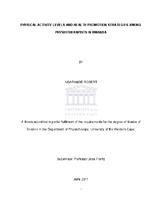| dc.description.abstract | Physical inactivity has become a global health concern and is among the 10 leading causes of death and disability. This has led to increased concern for chronic diseases of lifestyle (CDL). Studies have revealed that regular physical activity is effective in combating several CDL such as cardiovascular disease, diabetes, cancer, hypertension and obesity. Physiotherapists are in a position to combat inactivity and effectively promote physical activity to their clients. Studies however have shown that participation in physical activity among physiotherapists could have an impact on the promotion of physical activity and their health practices. This study therefore sought to establish the relationship between physical activity levels of physiotherapists and their physical activity promotion strategies and barriers to promoting physical activity. Sequential Mixed Method Design was used in this study. Data was collected by means of a self administered questionnaire and a total of 92 physiotherapists voluntarily answered the questionnaire. A focus group discussion comprising of 10 purposively selected physiotherapists was conducted. The questionnaire assessed physical activity levels and physical activity promoting strategies of the participants while the focus groupdiscussion looked at the barriers to promoting physical activity. The Statistical Packages for Social Sciences (SPSS) version 18 was used for data capturing and analysis. Descriptive statistics were employed to summarize demographic information as means, standard deviation, frequencies and percentages. Inferential statistics (chi-square) was used to test the associations between different categorical variables (p<0.05). For the qualitative data, focus group discussions were used to collect data. Tape recorded interviews were transcribed verbatim, field notes typed, sorting and arranging data was done and themes were generated. Thematic analysis was then done under the generated themes. Ethical issues pertaining to informed consent, anonymity, confidentiality and the right to withdraw from the study were respected in this current study. The findings in the current study revealed that a big number of the participants were physical active both at work and recreation domains. However, there was no statistically significant association between physical activity and the demographicvariables. The results in this study revealed that the majority of participants were good physical activity promoting practices, although there was no significant association between physical activity levels and the physical activity promoting practices. The finding in this study revealed that discussing physical activity and giving out information regarding physical activity to their clients were the most common methods used in promoting physical activity. However, participants also highlighted barriers they ace in promotion of physical activity such as policies on physical activity, cultural influence, nature of work, time management as well as environmental barriers. The study demonstrates the need for all stakeholders to come up with solutions to break the barriers to promotion of physical activity. In return it will bring about enormous health benefits to the general population. | en_US |

